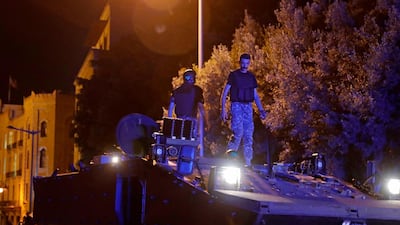Lebanon's Prime Minister Hassan Diab announced the resignation of his government on Monday amid public anger over the huge explosion that devastated the capital Beirut last week.
In a televised address, Mr Diab blamed the blast, which killed at least 160 people and left 6,000 wounded, on "endemic corruption" and said his government had been the "victim of rumours”.
But he said they must give in to demands for change from the public, who have taken to the streets over several nights in protest against the government's handling of the disaster.
“We want to open the door for national salvation," Mr Diab said. "I declare today the resignation of this government. May God protect Lebanon."
Mr Diab's announcement followed the resignation of his information, environment, justice and health ministers, and several members of parliament since the explosion last Tuesday.
On Sunday, Mr Diab told Britain's ITV News that the Lebanese people had a right to be furious after "decades of unbelievable corruption”.
“I am not afraid of the people’s fury," he said, as pressure mounted on him and his government to resign.
"Absolutely they have a right to be furious, not just because of this. It is absolutely diabolical what happened.
“However, they were also furious before that, about three decades of unbelievable corruption. We are here facing all of these accumulated problems.”
Member of Parliament Alain Aoun told The National that the government's resignation would not affect the continuing investigation into the explosion at Beirut's port.
“The government will likely stay as a caretaker but the investigation is in the hands of the judges and the attorney general, and they are not affected by changes to the government,” Mr Aoun said.
“Maybe the ministerial committee will not survive but the judges will continue their work. They have already started.”
Tuesday's blast compounded months of difficulties in Lebanon, which was already dealing with an economic collapse that had prompted months of protests.
Its strained health infrastructure was also struggling to deal with the coronavirus pandemic.
Veteran politician and leader of the Progressive Socialist Party Walid Joumblatt said the resignation of the government met the "basic demand" of the people after the disaster.
"Today, the demand has been fulfilled and we consider it a great political victory," Mr Joumblatt told Sky News.
Over the weekend, public anger spilled out on to the streets, with police using tear gas to disperse rock-throwing protesters.
Despite the resignation of Mr Diab and his government, protesters hurled rocks and fireworks at Parliament on Monday night, as riot police and military personnel tried to keep them back.
Lebanon's National News Agency reported that bullets were fired into the air in the northern city of Tripoli to mark the decision.















